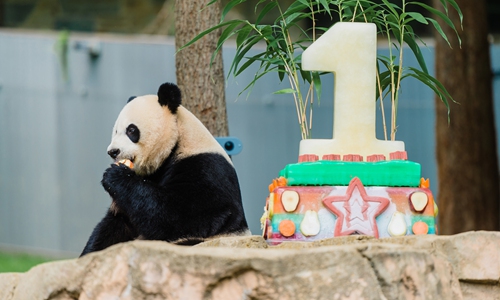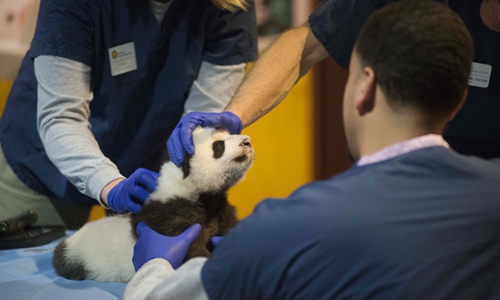Washington bids farewell to last panda cub
Source:AFP Published: 2019/11/17 17:13:39

Bei Bei celebrates his first birthday at the National Zoo in Washington DC on August 20, 2016. Photo: IC

Inset: Zoo staff examine 2-month old Bei Bei Photo: IC
He was born in Washington DC and took his first steps in the US capital, but at age 4, it's time to head "home" - to China.Bei Bei, the last young panda living at the National Zoo, will leave Washington on Tuesday aboard a specially outfitted FedEx plane, as planned even before he took his first breath.
Such are the strict rules of "panda diplomacy."
Tearful goodbye
In front of the zoo's panda enclosure on a chilly day, schoolchildren in winter coats and hats line up to say farewell, many of them with signs reading "Bye bye Bei Bei."
The National Zoo - a branch of the venerable Smithsonian, the world's largest museum and research complex - has organized a week of events to celebrate the departure of Bei Bei, which means "precious, treasure" in Chinese.
Kids can write postcards for the panda, which will go with him to China, watch zookeepers offer him special treats, attend Q&A sessions with zoo personnel or just watch him play.
Through it all, Bei Bei... munches on bamboo.
Marty Dearie is one of Bei Bei's keepers. He saw the male cub born in August 2015 on the "panda cam" - which is trained on the zoo's pandas around the clock. Bei Bei, who now weighs a healthy 114 kilograms, lives with his parents, dad Tian Tian and mom Mei Xiang.
"Our job has been to get him prepared for the trip to China from the moment he was born," Dearie told AFP.
"We knew that was coming - it's part of the loan agreement."
China's "panda diplomacy" has evolved over the years.
At one point in time, Beijing gave pandas to friendly nations, but now that the animals are considered "vulnerable" to extinction by the International Union for Conservation of Nature, China lends pandas to zoos around the world.
Once a panda reaches the age of 4, he or she is repatriated to breed with other animals at sanctuaries in China.
Bei Bei's siblings, brother Tai Shan and sister Bao Bao, have already been returned to China.
Tian Tian and Mei Xiang will remain at the National Zoo until at least December 2020, when a new deal would need to be negotiated.
Even though the conditions were always set in stone, Dearie is still heartbroken to see Bei Bei go.
"I'm a very emotional person, I can admit to that," he said.
"I'm sure on the day of the move for Bei Bei, I'll be in some tears."
Honey and sugarcane
Moving a giant panda to another continent is no easy task.
For several weeks, Bei Bei's keepers have been training him to sit in the crate in which he will travel to China on the nonstop 16-hour flight from Washington to Chengdu.
"At this point, we were able to close both doors and he sits in there comfortably," says Dearie.
A keeper and a veterinarian will make the trip with Bei Bei. The National Zoo staff will prepare a special stash of treats for him - like most giant pandas, he eats constantly.
"We'll probably be taking 15 or 20 kilos of bamboo with him at least. He'll also get apples, sweet potatoes, carrots. We'll probably take some sugarcane. There might be honey, biscuits," Dearie explains.
FedEx is paying for the flight and the special outfitting of the Boeing 777 - called the "Panda Express" for the occasion.
"Bei Bei and his 'luggage' will be the only shipment on the aircraft," said FedEx spokeswoman Rae Lyn Rushing.
Both the public and his keepers have been enthralled with Bei Bei from the get-go: from his first steps, to an operation in 2016 to remove a lemon-sized chewed-up mass of bamboo from his intestines, to his departure.
The giant panda's name was revealed at a naming ceremony in 2015 presided over by then US first lady Michelle Obama and Peng Liyuan, the wife of current Chinese President Xi Jinping.
Such baptisms are now a ritual at other zoos around the world - France's first lady Brigitte Macron attended a similar ceremony with Chinese officials at the Beauval zoo when cub Yuan Meng was named.
Beyond being universally adored, pandas have become an "extremely successful" policy tool for China, according to Liselotte Odgaard, a visiting senior fellow at the Hudson Institute think tank who specializes in US-China-Europe relations.
"It's a symbol of China's history, its benevolence, its generosity."
Of course, it's also a lucrative policy tool - zoos pay China millions of dollars a year for their pandas, which bring in hordes of visitors.
It's a regular "panda business," Odgaard says.
Newspaper headline: Bye bye Bei Bei
Posted in: CULTURE & LEISURE,TOUCH OF WARMTH,ARTS FOCUS